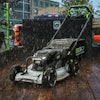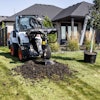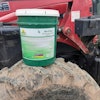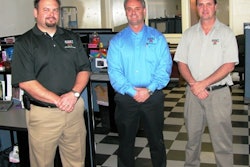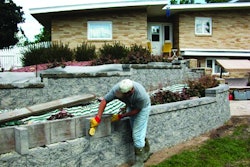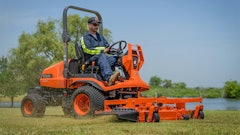Contractor Mark Bradley has been able to grow his sales from $3.5-$7 million without adding a single employee. How? He’s turned his foremen into “mini owners”, and the results have been amazing.
Bradley spoke to a crowd of contractors attending the JP Horizons “A Better Way” Reunion Jam in New Orleans March 5-6. Bradley’s company, Toronto-based The Beach Gardener, is a high-end residential design/build firm.
Foremen Must Know The Numbers
Bradley decided that everyone in the company, including foremen, must understand the basic financial breakdown of the company. Foremen and crews also understand that the more work they can get done in a given time period, the more work Bradley can sell. The more Bradley can sell, the sooner crews can recover their overhead. And the sooner crews can recover their overhead, the bigger their bonuses are.
Bradley has made his budgeting process transparent. He has also made sure that everybody in the company understood what the budget meant to them.
Bradley breaks everything down by divisions, then by crews. He talks in ratios. For example, 60% of sales goes to direct costs (materials and labor), 20% goes to overhead, 20% is profit.
Every crew knows what its production (sales) goal is for the year. “Once a crew understood how much revenue it was expected to generate, and also understood how many man-hours it had available, it was very easy to get employee buy-in,” Bradley relates.
The Bonus System
Once a crew hits its production goal for the year, and all overhead is thus recovered, some serious money starts getting dumped into that crew’s bonus pot.
For example, if the crew hits its production goal on October 15, the 20% of sales allocated for overhead now gets dumped into a bonus pool for the next two and a half months. The foreman then decides, at the end of the year, how much each crew member earns for a bonus.
“Everyone in the company is just as determined as I am, starting on January 1, to hit our sales goal,” Bradley relates. “More than that, they want to hit that sales goal by being as efficient as possible—because if they don’t make our budgeted efficiency rating, they don’t get that 20% profit.”
Each crew’s sales goal, sales to date and efficiency number hang on a wall at The Beach Gardener all year long. This constant reminder keeps crews focused.
Don’t Focus on Production Alone
It’s dangerous to focus only on production hours, Bradley found out. When production is the only thing that matters, quality issues can arise.
That’s why the efficiency rating is also very important. When you have an overall company efficiency goal, and each crew is held accountable for their part in the overall efficiency, teamwork blossoms. Furthermore, foremen become entrepreneurs.
Foremen Must Reinforce Systems
The Beach Gardener’s efficiency rating has increased by 50% since implementing this “budget transparency and bonus system culture” (it’s now at 94%). Aside from a crew’s motivation to make more money, the key to this phenomenal improvement has been systems.
“It’s the owner’s responsibility to create systems and provide training,” Bradley says. “Foremen must then reinforce those systems, and employees have to use them—and develop their skills within those systems.”
Systems, which are basically “repeatable processes,” should be focused on production. Weekly meetings help reinforce the systems. On-site training is also very effective.
“Foremen need to become comfortable teaching their crews how to use these systems,” Bradley points out. “Then they need to enforce them, because if you’re really going to be successful, you need employees out in the field who are really living your culture.” That’s where superstar foremen come into play.

